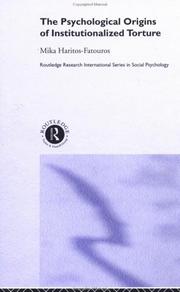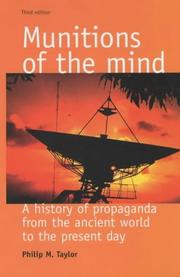| Listing 1 - 6 of 6 |
Sort by
|

ISBN: 1282861611 9786612861611 0773571604 9780773571600 0773526412 9780773526419 0773526420 9780773526426 Year: 2003 Publisher: Montreal ; Ithaca : McGill-Queen's University Press,
Abstract | Keywords | Export | Availability | Bookmark
 Loading...
Loading...Choose an application
- Reference Manager
- EndNote
- RefWorks (Direct export to RefWorks)
Marchak departs significantly from mainstream explanations of genocide, rejecting racism as a fundamental cause and disputing a wide range of other explanations that cite racist and religious ideologies, perception of threat, authoritarianism, and unique historical circumstances as primary causes. She argues that while these variables may be contributing factors, states move toward human rights crimes because their governments can no longer sustain a particular social hierarchy. Reasons for their paralysis may be economic, environmental, demographic, or purely political. In an attempt to re-establish the former status quo, they turn against groups low on the hierarchical scale, some of which may be defined in ethnic terms. If governments come into power as revolutionary forces, they may commit such crimes in order to establish a new social hierarchy. Other necessary but insufficient conditions for state crimes include the military capacity for committing mass murder, the creation of ideology that justifies such action, and the failure of independent institutions such as the mass media and universities to counter ideological and military forces. Reigns of Terror is highly accessible and aimed at an audience of senior undergraduates, graduate students, and faculty in the social sciences, as well as a more general reading public concerned about the many state-sponsored crimes against humanity still occurring in the world.
Crimes against humanity. --- Genocide --- Political atrocities --- Atrocities --- Cleansing, Ethnic --- Ethnic cleansing --- Ethnic purification --- Ethnocide --- Purification, Ethnic --- Crime --- Sociology of genocide --- Sociology --- International crimes --- War crimes --- Sociological aspects. --- History

ISBN: 0203714997 1283886383 1135646643 9781135646646 9780203714997 0415282764 9780415282765 9781135646783 1135646783 9781135646714 1135646716 9781138880269 1138880264 9781283886383 Year: 2003 Volume: 4 Publisher: London ; New York : Routledge,
Abstract | Keywords | Export | Availability | Bookmark
 Loading...
Loading...Choose an application
- Reference Manager
- EndNote
- RefWorks (Direct export to RefWorks)
Original research, including interviews with former Greek torturers, is supplemented by discussion of former studies, military records and other sources, to provide disturbing but valuable insights into the psychology of torture. The book describes parallel situations such as the rites of passage in pre-industrial societies and cults, elite Corps military training and college hazing, eventually concluding that the torturer is not born, but made.Of essential interest to academics and students interested in social psychology and related disciplines, this book will also be extremely valuable
Torture --- State-sponsored terrorism. --- Cruelty --- Punishment --- Extraordinary rendition --- Government violence --- Governmental violence --- State-sponsored violence --- State terrorism --- Violence, Governmental --- Violence, State-sponsored --- Political atrocities --- Terrorism --- Psychological aspects.
Book
ISBN: 2845860889 9782845860889 Year: 2003 Publisher: Paris: Karthala,
Abstract | Keywords | Export | Availability | Bookmark
 Loading...
Loading...Choose an application
- Reference Manager
- EndNote
- RefWorks (Direct export to RefWorks)
La guerre au Guatemala a été une guerre de massacres. De toutes les guerres centraméricaines, et sans doute de tous les conflits armés en Amérique latine depuis les années 1960, elle a été la plus atroce et la plus coûteuse en vies humaines. Elle a connu deux étapes bien distinctes : l'une, dans les années 1960, centrée sur uen région de l'Oriente peuplée surtout de paysans "ladinos" (=non indiens) ; l'autre, dans les années 1970-1980, centrée sur l'occident indien. La première a donné lieu à une campagne anti-insurrectionnelle classique, avec son lot de massacres civils. Dans la seconde, la cible principale de l'armée fut la population civile non combattante, presque exclusivement indigène. Un processus de paix long et laborieux a débouché en décembre 96 sur des accores de paix qui ont mis fin à ce conflit de plus de trente ans.
State-sponsored terrorism --- Political violence --- Terrorisme d'Etat --- Violence politique --- Guatemala --- History --- Histoire --- Victims of state-sponsored terrorism --- Political atrocities --- Women --- Mayas --- Crimes against --- Government relations --- Armed Forces --- Political activity --- Droits de l'homme --- Guerre --- Mémoire collective --- Politique et gouvernement --- Government relations. --- Guerre. --- State-sponsored terrorism - Guatemala --- Victims of state-sponsored terrorism - Guatemala --- Political atrocities - Guatemala --- Political violence - Guatemala --- Women - Crimes against - Guatemala --- Mayas - Guatemala - Government relations --- Guatemala - Armed Forces - Political activity --- Guatemala - History - Civil War, 1960-1996

Abstract | Keywords | Export | Availability | Bookmark
 Loading...
Loading...Choose an application
- Reference Manager
- EndNote
- RefWorks (Direct export to RefWorks)
Anti-American propaganda --- Dictatorship [Terrorist ] --- Dictature terroriste --- Dictatuur [Terroristische ] --- Geweld [Staats] --- Propaganda [Anti-American ] --- Propaganda [Anti-Amerikaanse ] --- Propagande anti-americaine --- Staatsgeweld --- Staatsterrorisme --- State violence --- State-sponsored terrorism --- Terrorism and mass media --- Terrorisme d'Etat --- Terrorisme en massamedia --- Terrorisme et mass media --- Terrorist dictatorship --- Terroristische dictatuur --- Violence [State ] --- Violence d'Etat --- #KVHA:Retoriek --- #KVHA:Argumentatie --- #KVHA:Propaganda --- Propaganda, Anti-American --- Propaganda --- Mass media and terrorism --- Mass media --- Government violence --- Governmental violence --- State-sponsored violence --- State terrorism --- Violence, Governmental --- Violence, State-sponsored --- Political atrocities --- Terrorism --- History --- Propaganda, Anti-American. --- State-sponsored terrorism. --- Terrorism and mass media. --- History. --- Propaganda History

ISBN: 1847790925 1280734655 9786610734658 1423706633 9781423706632 9781847790927 9780719067679 0719067677 9780719067662 0719067669 9781280734656 Year: 2003 Publisher: Manchester ; New York : New York : Manchester University Press ; Distributed exclusively in the USA by Palgrave,
Abstract | Keywords | Export | Availability | Bookmark
 Loading...
Loading...Choose an application
- Reference Manager
- EndNote
- RefWorks (Direct export to RefWorks)
A classic work, Munitions of the mind traces how propaganda has formed part of the fabric of conflict since the dawn of warfare, and how in its broadest definition it has also been part of a process of persuasion at the heart of human communication. Stone monuments, coins, broadsheets, paintings and pamphlets, posters, radio, film, television, computers and satellite communications - propaganda has had access to ever more complex and versatile media." "This third edition has been revised and expanded to include a new preface, new chapters on the Gulf War, information age conflict in the post-Cold War era, and the world after the terrorist attacks of September 11. It also offers a new epilogue and comprehensive bibliographical essay." "The range of this book, as well as the analysis it offers, makes it an ideal text for all international courses covering media and communications studies, cultural history, military history and politics. It will prove accessible to the general reader."
Propaganda. --- Oorlog. --- Terrorism and mass media. --- State-sponsored terrorism. --- Propaganda, Anti-American. --- Society and social sciences. --- SOCIAL SCIENCE --- Politics and government. --- Political control and freedoms. --- Terrorisme et medias. --- Terrorisme d'État. --- Propagande antiamericaine. --- Propagande --- Propaganda --- Government violence --- Governmental violence --- State-sponsored violence --- State terrorism --- Violence, Governmental --- Violence, State-sponsored --- Political atrocities --- Terrorism --- Mass media and terrorism --- Mass media --- Communication in politics --- Political psychology --- Social influence --- Advertising --- Persuasion (Psychology) --- Psychological warfare --- Public relations --- Publicity --- Social pressure --- Behavioral sciences --- Human sciences --- Sciences, Social --- Social science --- Social studies --- Civilization --- Anti-American propaganda --- General. --- Histoire. --- History. --- Terrorism. --- Propaganda History --- History --- Radioactive Terrorism --- Terrorism, Radioactive --- Persuasive Communication --- Psychological Warfare --- Middle Ages. --- ancient Greeks. --- civilization. --- civilized society. --- humanity. --- hypocrisy. --- peace propagandists. --- propaganda. --- scrutiny. --- terrorism. --- violence. --- wars.

ISBN: 0520936906 1282359622 9786612359620 159734625X 9780520936904 0585466467 9780585466460 0520230809 9780520230804 0520236572 9780520236578 9781597346252 9781282359628 6612359625 Year: 2003 Publisher: Berkeley : University of California Press,
Abstract | Keywords | Export | Availability | Bookmark
 Loading...
Loading...Choose an application
- Reference Manager
- EndNote
- RefWorks (Direct export to RefWorks)
James Ron uses controversial comparisons between Serbia and Israel to present a novel theory of state violence. Formerly a research consultant to Human Rights Watch and the International Red Cross, Ron witnessed remarkably different patterns of state coercion. Frontiers and Ghettos presents an institutional approach to state violence, drawing on Ron's field research in the Middle East, Balkans, Chechnya, Turkey, and Africa, as well as dozens of rare interviews with military veterans, officials, and political activists on all sides. Studying violence from the ground up, the book develops an exciting new framework for analyzing today's nationalist wars.
Israel - Ethnic relations - Political aspects. --- Serbia - Ethnic relations - Political aspects. --- Serbia - Politics and government - 1992-. --- Serbia-- Ethnic relations-- Political aspects. --- State-sponsored terrorism. --- State-sponsored terrorism - Israel. --- State-sponsored terrorism - Yugoslavia - Serbia. --- State-sponsored terrorism --- Regions & Countries - Europe --- History & Archaeology --- Balkan Peninsula --- Serbia --- Israel --- Ethnic relations --- Political aspects. --- Politics and government --- Government violence --- Governmental violence --- State-sponsored violence --- State terrorism --- Violence, Governmental --- Violence, State-sponsored --- Izrailʹ --- Medinat Yiśraʼel --- Yiśraʼel --- Izrael --- Isrāʼīl --- Israele --- Isŭrael --- I-se-lieh --- Medinat Israel --- State of Israel --- ישראל --- מדינת ישראל --- إسرائيل --- دولة إسرائيل --- Dawlat Isrāʼīl --- Ізраіль --- Дзяржава Ізраіль --- Dzi︠a︡rz︠h︡ava Izrailʹ --- Stát Izrael --- Država Izrael --- Ισραήλ --- Израиль --- Государство Израиль --- Gosudarstvo Izrailʹ --- イスラエル --- Isuraeru --- 以色列 --- Yiselie --- SRS --- RS de Serbije --- SR Srbija --- Srbija --- Servia --- Sot︠s︡ialisticheskai︠a︡ Respublika Serbii︠a︡ --- Serbii︠a︡ --- Narodna Republika Srbija --- N.R. Serbii︠a︡ --- NR Serbii︠a︡ --- Socialist Republic of Serbia --- Republic of Serbia --- Socijalistička Republika Srbija --- Republika Srbija --- People's Republic of Serbia --- Szerbia --- Србија --- Political atrocities --- Terrorism --- Serbia and Montenegro --- Palestine --- Terrorisme d'Etat --- Serbie --- Israël --- Relations interethniques --- Aspect politique --- Politique et gouvernement --- africa. --- anthropology. --- balkans. --- chechnya. --- comparative politics. --- cultural anthropology. --- cultural social. --- ethnic studies. --- frontier life. --- government officials. --- history of violence. --- human rights. --- institutional violence. --- interviews. --- israel. --- jewish ghettos. --- middle east. --- military veterans. --- nationalism. --- political activists. --- political analysts. --- political violence. --- political. --- serbia. --- sociologists. --- state violence. --- theoretical framework. --- turkey. --- war. --- warring states.
| Listing 1 - 6 of 6 |
Sort by
|

 Search
Search Feedback
Feedback About UniCat
About UniCat  Help
Help News
News